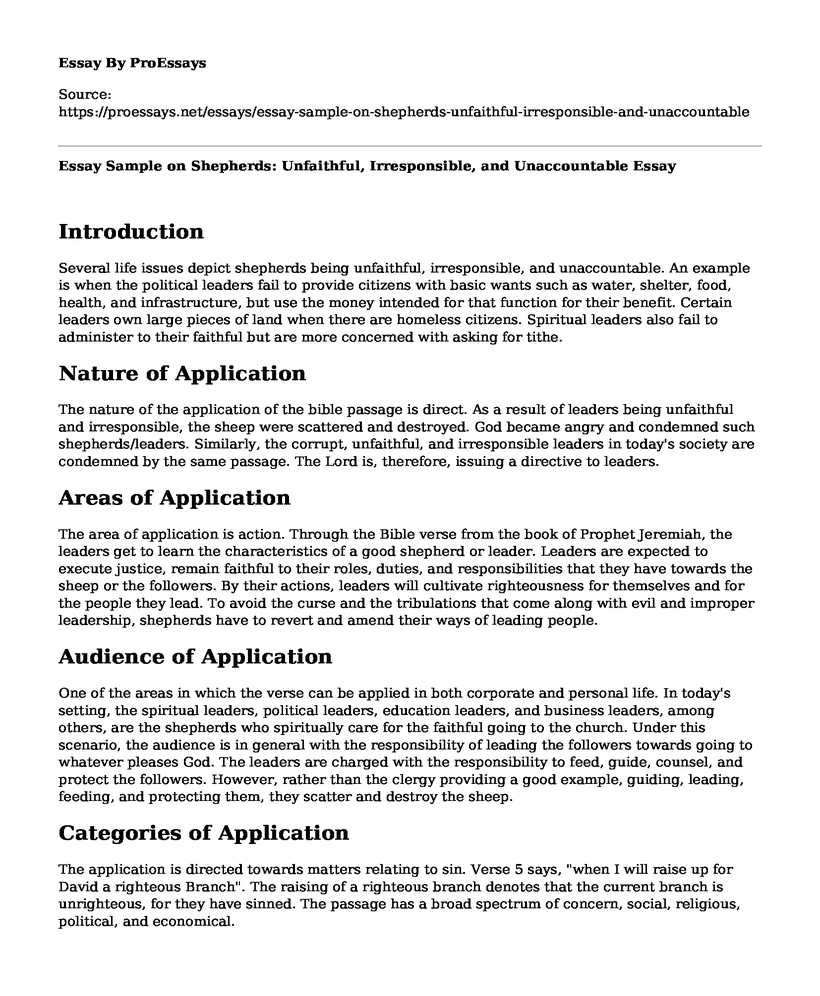Introduction
Several life issues depict shepherds being unfaithful, irresponsible, and unaccountable. An example is when the political leaders fail to provide citizens with basic wants such as water, shelter, food, health, and infrastructure, but use the money intended for that function for their benefit. Certain leaders own large pieces of land when there are homeless citizens. Spiritual leaders also fail to administer to their faithful but are more concerned with asking for tithe.
Nature of Application
The nature of the application of the bible passage is direct. As a result of leaders being unfaithful and irresponsible, the sheep were scattered and destroyed. God became angry and condemned such shepherds/leaders. Similarly, the corrupt, unfaithful, and irresponsible leaders in today's society are condemned by the same passage. The Lord is, therefore, issuing a directive to leaders.
Areas of Application
The area of application is action. Through the Bible verse from the book of Prophet Jeremiah, the leaders get to learn the characteristics of a good shepherd or leader. Leaders are expected to execute justice, remain faithful to their roles, duties, and responsibilities that they have towards the sheep or the followers. By their actions, leaders will cultivate righteousness for themselves and for the people they lead. To avoid the curse and the tribulations that come along with evil and improper leadership, shepherds have to revert and amend their ways of leading people.
Audience of Application
One of the areas in which the verse can be applied in both corporate and personal life. In today's setting, the spiritual leaders, political leaders, education leaders, and business leaders, among others, are the shepherds who spiritually care for the faithful going to the church. Under this scenario, the audience is in general with the responsibility of leading the followers towards going to whatever pleases God. The leaders are charged with the responsibility to feed, guide, counsel, and protect the followers. However, rather than the clergy providing a good example, guiding, leading, feeding, and protecting them, they scatter and destroy the sheep.
Categories of Application
The application is directed towards matters relating to sin. Verse 5 says, "when I will raise up for David a righteous Branch". The raising of a righteous branch denotes that the current branch is unrighteous, for they have sinned. The passage has a broad spectrum of concern, social, religious, political, and economical.
Time Focus of the Application
The passage is a combination of both the past and the future. While it calls for leaders to recognize their failures in the past and be good shepherds, it also looks into the future and highlights a punishment and condemnation that is to come for not heeding the call. The application does not depend on the nature of the audience or any other factor whatsoever, but on the need for the leaders to focus on change to avoid condemnation.
Limits
The passage act as a support to God's call to repentance and reconciliation. Since the fall of humankind in the boog of Genesis, God has always wished to restore the perfect relationship. To achieve the perfect relationship, God calls human beings to be good, responsible, and faithful to inherit His kingdom. Hence the passage by Prophet Jeremiah acts as a support to the original message of reconciliation.
Question
The interaction with the published translations raised the questions on how soon God would select new leaders. Besides, the question of what form of punishment that God would inflict to the unfaithful leaders arises.
Cite this page
Essay Sample on Shepherds: Unfaithful, Irresponsible, and Unaccountable. (2023, May 07). Retrieved from https://proessays.net/essays/essay-sample-on-shepherds-unfaithful-irresponsible-and-unaccountable
If you are the original author of this essay and no longer wish to have it published on the ProEssays website, please click below to request its removal:
- The Eucharist Sacrament, Sign, and Symbols Essay
- Book of Esther is in the Old Testament of the Bible: Research Paper
- Case Study: Healing and Autonomy
- Hope: Biblical Definition & Its Relevance for Christians - Essay Sample
- Research Paper on Confucius: Advocating Ethical Reform and the Golden Rule
- Charlemagne: Unifying Germanic People & Spreading Christianity - Essay Sample
- The Epic Tales of David & Goliath & The Odyssey - Essay Example







